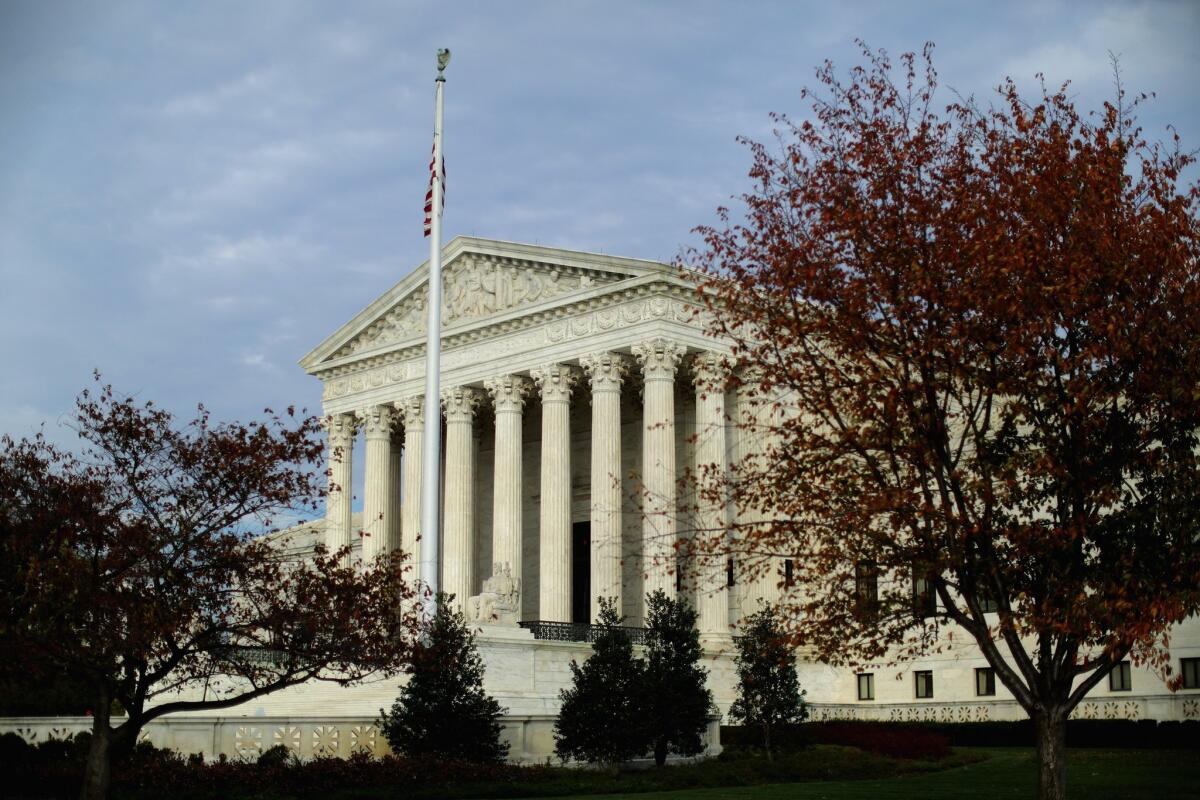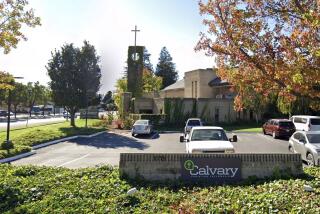Supreme Court rejects challenge to California limits on church crowds during pandemic

- Share via
WASHINGTON — A sharply divided Supreme Court on Friday rejected a challenge to California’s limits on large church gatherings during the COVID-19 pandemic, dismissing an appeal brought by a San Diego-area church that argued state rules infringed on its religious freedom.
The justices by 5-4 vote said California could enforce its rules, at least for now. Chief Justice John G. Roberts joined the court’s four liberal justices in upholding the state’s rules.
“The precise question of when restrictions on particular social activities should be lifted during the pandemic is a dynamic and fact-intensive matter subject to reasonable disagreement. Our Constitution principally entrusts ‘the safety and the health of the people’ to the politically accountable officials of the states ‘to guard and protect,’” Roberts wrote.
Justice Brett M. Kavanaugh wrote a dissent, joined by Justices Clarence Thomas and Neil M. Gorsuch.
“California’s latest safety guidelines discriminate against places of worship and in favor of comparable secular businesses. Such discrimination violates the 1st Amendment,” he said.
“California already trusts its residents and any number of businesses to adhere to proper social distancing and hygiene practices,” he said. “The state cannot assume the worst when people go to worship but assume the best when people go to work or go about the rest of their daily lives in permitted social settings.”
Justice Samuel A. Alito also said he would have granted the church’s appeal.
The court’s decision may blunt a drive by religious conservatives to enlist judges to reopen churches and to free religious gatherings from state limits on indoor crowds.
Lawyers for the church argued that the 1st Amendment’s protection of the “free exercise” of religion meant the government could not shut down church services or limit their attendance, particularly if it was allowing businesses — from factories to grocery stores — to remain open.
President Trump took up their cause a week ago. He said churches and other houses of worship should be deemed “essential,” and he asserted he would “override the governors” if they failed to allow religious institutions to fully open.
The president does not have direct authority over a state’s quarantine measures, but federal judges could override a state’s regulations if they were deemed to be unconstitutional. And the Supreme Court, with two Trump appointees, Kavanaugh and Gorsuch, has shown an increasing interest in religious-liberty cases.
But the legal claims tied to the pandemic appear to have fallen short. Most judges have been reluctant to interfere with health and safety rules that aim to prevent the spread of the virus. And those rules are changing as states move to reopen.
Those changes may have been crucial in the outcome of the California case.
Late last week, lawyers for the South Bay United Pentecostal Church in Chula Vista filed an emergency appeal with the Supreme Court, seeking an order that would permit a church service on Sunday. They were contesting California’s “stay-at-home” regulations that prevented churches, theaters and other gathering places from opening their doors.
But earlier this week, Gov. Gavin Newsom issued new guidelines that will allow houses of worship to reopen, but with limits on their attendance. Under the new rules, churches and other faith centers may have no more than 100 people present at a time or occupy more than 25% of the capacity of their building, whichever is smaller.
Earlier Friday, the court unanimously rejected a second and similar appeal that challenged an Illinois regulation that limited churches to having 10 people at a time. But Gov. Jay Pritzker already had announced that the regulation would end on Friday.
Lawyers for the churches denounced what they called “11th-hour attempts by California and Illinois to moot” challenges to their laws, and they urged the justices to exempt them from the new restrictions on attendance.
“California is still violating plaintiff’s fundamental constitutional rights, and millions of Americans across the country are still having their constitutional rights trampled upon,” they said Friday.
The Chula Vista church and Bishop Arthur Hodges III first sought a court order on May 8 that would shield them from the state’s restrictions, but they lost before a federal judge in San Diego and by a 2-1 vote in the U.S. 9th Circuit Court of Appeals. The appeals court upheld California’s rules in a brief decision on May 22.
“We’re dealing here with a highly contagious and often fatal disease for which there presently is no known cure,” wrote Judge Barry Silverman, an appointee of President Clinton.
The dissent came from Judge Daniel P. Collins, a new appointee of Trump’s, who noted that factories and warehouses were open and operating while churches were closed.
In its appeal to the Supreme Court, the church urged the justices to act quickly to open services for this Sunday, the “Christian holy day of Pentecost.” It said the “sanctuary seats 600 persons, and each service normally brings in between 200 and 300 congregants. Some of the larger houses of worship in California can seat 1,000 congregants or more. But under California’s guidelines, plaintiffs will only be permitted to welcome 100 congregants, with no explanation as to the justification for this arbitrary cap.”
“In contrast, there is no percentage limitation for manufacturing and warehousing facilities — simply a social distancing requirement,” the church’s lawyers added. “California has never explained why letting large numbers of people sit together indoors for eight hours at a factory or a school, but not for one hour worshiping, provides a ‘real or substantial’ benefit to curbing the COVID-19 pandemic,” they wrote.
Attorneys for California advised the court to dismiss the appeal.
“Labor in manufacturing facilities, warehouses and offices does not typically involve large numbers of people singing or reading aloud together in the same place, in close proximity to one another, for an extended duration,” the state’s lawyers said. They noted that church gatherings in Sacramento, Seattle, Kentucky and South Korea have been blamed for the early spread of the virus.
Under the new guidelines, the church may hold a worship service on Sunday, and it could accommodate more people by scheduling several services during the day, the state lawyers said.
More to Read
Get the L.A. Times Politics newsletter
Deeply reported insights into legislation, politics and policy from Sacramento, Washington and beyond. In your inbox three times per week.
You may occasionally receive promotional content from the Los Angeles Times.











